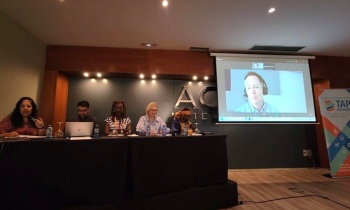QUNO spotlights Local Peacebuilders at FfD4: A Call for Sustainable and Inclusive Financing

The 4th International Financing for Development (FfD4) Conference began on 30 June, bringing together world leaders, international and regional organizations, civil society, the private sector and the UN system to advance a new policy for financing sustainable development. As part of this global convening, the Quaker United Nations Office (QUNO) New York, in partnership with the Transparency, Accountability, and Participation (TAP) Network and the Civil Society Platform for Peacebuilding and Statebuilding (CSPPS), hosted a side event titled “Financing for Development in the Humanitarian-Development-Peacebuilding Nexus: Locally Led Approaches Towards Peaceful, Just, and Inclusive Societies.” QUNO NY UN Representative Kavita Desai moderated the session, which offered an important space to reflect on financing strategies for local peacebuilding efforts amid increasingly complex political contexts.
The need to advocate for sustainable financing for local peacebuilders is more pressing than ever, especially as the global financing landscape becomes increasingly competitive. A growing trend, coined the "humanitarianization of development aid", has seen official development assistance (ODA) increasingly diverted towards new crises and humanitarian emergencies, often diverted to activities located in the Global North, like refugee resettlement support and military spending while coming at the expense of long-term development and peacebuilding efforts in the Global South. This reactive funding approach has left local actors, particularly peacebuilders, struggling to access increasingly scarce resources. Additionally, cuts in international development aid by many donor countries have further compounded this issue, creating a funding environment where grassroots peacebuilders are forced to compete for limited and often unsustainable opportunities.
This side event aimed to elevate these challenges, providing a platform for global leaders and civil society actors to engage in meaningful dialogue and share practical solutions. The session not only spotlighted barriers in accessing funding but also delved into untenable funding conditions. Many local NGOs, especially those operating in rural areas, face significant hurdles at the very outset of the funding application process due to language limitations and technological constraints.
In her opening remarks, Assistant Secretary-General for Peacebuilding Support, Elizabeth Spehar, highlighted the reality that local NGOs from smaller, decentralized communities are often overlooked in favor of organizations based in major capitals, whose greater language fluency and digital capacity make them more accessible to donors. This imbalance not only leaves behind those who are most in need of support but also undermines the inclusivity and sustainability of development efforts.
Despite these challenges, the discussion also offered hope and direction through a focus on solutions. Spehar emphasized the importance of advocating for more flexible and long-term funding models. A flexible approach would adapt to the diverse needs of local contexts and support the livelihoods of peacebuilders working in fragile or conflict-affected areas.
Building on this, panelists shared best practices to inform future financing strategies. Kavita Desai facilitated a robust exchange of lessons learned, beginning with Matthew Cogan of Ireland’s Department of Foreign Affairs, who described the country’s move toward five-year funding commitments for local peacebuilders. This model enables NGOs to plan strategically, demonstrate long-term impact, and meet accountability benchmarks more effectively.
Other innovative models were uplifted as best practices, including Sierra Leone’s Mineral Well Fund which demonstrates how countries can harness natural resource revenues to invest in community development and peacebuilding initiatives. Efforts like these point to a hopeful path forward that would enable meaningful progress toward achieving the 2030 Agenda for Sustainable Development.
QUNO co-hosted this side event, which built upon a discussion hosted in October 2024 on financing local peacebuilders, to further underscore the importance of global solidarity and shared responsibility in creating a financial system that empowers local actors and builds lasting peace.
The concept note and summary of the event are forthcoming.


